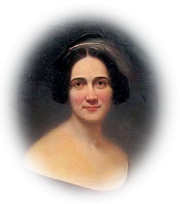August 8th.–To-day I saw a sword captured at Manassas. The man who brought the sword, in the early part of the fray, was taken prisoner by the Yankees. They stripped him, possessed themselves of his sleeve-buttons, and were in the act of depriving him of his boots when the rout began and the play was reversed; proceedings then took the opposite tack.
From a small rill in the mountain has flowed the mighty stream which has made at last Louis Wigfall the worst enemy the President has in the Congress, a fact which complicates our affairs no little. Mr. Davis’s hands ought to be strengthened; he ought to be upheld. A divided house must fall, we all say.
Mrs. Sam Jones, who is called Becky by her friends and cronies, male and female, said that Mrs. Pickens had confided to the aforesaid Jones (nee Taylor, and so of the President Taylor family and cousin of Mr. Davis’s first wife), that Mrs. Wigfall “described Mrs. Davis to Mrs. Pickens as a coarse Western woman.” Now the fair Lucy Holcombe and Mrs. Wigfall had a quarrel of their own out in Texas, and, though reconciled, there was bitterness underneath. At first, Mrs. Joe Johnston called Mrs. Davis “a Western belle,” ¹ but when the quarrel between General Johnston and the President broke out, Mrs. Johnston took back the “belle” and substituted “woman” in the narrative derived from Mrs. Jones.
Commodore Barron ² came with glad tidings. We had taken three prizes at sea, and brought them in safely, one laden with molasses. General Toombs told us the President complimented Mr. Chesnut when he described the battle scene to his Cabinet, etc. General Toombs is certain Colonel Chesnut will be made one of the new batch of brigadiers. Next came Mr. Clayton, who calmly informed us Jeff Davis would not get the vote of this Congress for President, so we might count him out.
Mr. Meynardie first told us how pious a Christian soldier was Kershaw, how he prayed, got up, dusted his knees and led his men on to victory with a dash and courage equal to any Old Testament mighty man of war.
Governor Manning’s account of Prince Jerome Napoleon : “He is stout and he is not handsome. Neither is he young, and as he reviewed our troops he was terribly overheated.” He heard him say “en avant,” of that he could testify of his own knowledge, and he was told he had been heard to say with unction “Allons ” more than once. The sight of the battle-field had made the Prince seasick, and he received gratefully a draft of fiery whisky.
Arrago seemed deeply interested in Confederate statistics, and praised our doughty deeds to the skies. It was but soldier fare our guests received, though we did our best. It was hard sleeping and worse eating in camp. Beauregard is half Frenchman and speaks French like a native. So one awkward mess was done away with, and it was a comfort to see Beauregard speak without the agony of finding words in the foreign language and forming them, with damp brow, into sentences. A different fate befell others who spoke “a little French.”
General and Mrs. Cooper came to see us. She is Mrs. Smith Lee’s sister. They were talking of old George Mason–in Virginia a name to conjure with. George Mason violently opposed the extension of slavery. He was a thorough aristocrat, and gave as his reason for refusing the blessing of slaves to the new States, Southwest and Northwest, that vulgar new people were unworthy of so sacred a right as that of holding slaves. It was not an institution intended for such people as they were. Mrs. Lee said: “After all, what good does it do my sons that they are Light Horse Harry Lee’s grandsons and George Mason’s? I do not see that it helps them at all.”
A friend in Washington writes me that we might have walked into Washington any day for a week after Manassas, such were the consternation and confusion there. But the god Pan was still blowing his horn in the woods. Now she says Northern troops are literally pouring in from all quarters. The horses cover acres of ground. And she thinks we have lost our chance forever.
A man named Grey (the same gentleman whom Secretary of War Walker so astonished by greeting him with, “Well, sir, and what is your business?”) described the battle of the 21st as one succession of blunders, redeemed by the indomitable courage of the two-thirds who did not run away on our side. Doctor Mason said a fugitive on the other side informed him that “a million of men with the devil at their back could not have whipped the rebels at Bull Run.” That’s nice.
There must be opposition in a free country. But it is very uncomfortable. “United we stand, divided we fall.” Mrs. Davis showed us in The New York Tribune an extract from an Augusta (Georgia) paper saying, “Cobb is our man. Davis is at heart a reconstructionist.” We may be flies on the wheel, we know our insignificance; but Mrs. Preston and myself have entered into an agreement; our oath is recorded on high. We mean to stand by our President and to stop all fault-finding with the powers that be, if we can and where we can, be the fault-finders generals or Cabinet Ministers.
______
¹ Mrs. Davis was born in Natchez, Mississippi, and educated in Philadelphia. She was married to Mr. Davis in 1845. In recent years her home has been in New York City, where she still resides (Dec. 1904).
² Samuel Barron was a native of Virginia, who had risen to be a captain in the United States Navy. At the time of Secession he received a commission as Commodore in the Confederate Navy.
